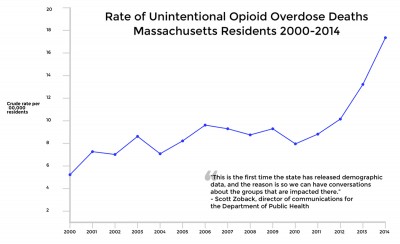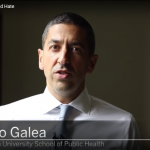
The Massachusetts Department of Public Health released demographic statistics last week, proving that people between the ages of 25 and 44 are most at risk for opioid-related death.
Between January and September of 2015, 450 people between the ages of 25 and 44 were confirmed to have died of unintentional opioid overdose. These combined age groups constitute 56.9 percent of the total 791 confirmed deaths caused by opioid overdose in 2015.
The release defined opioids to include, “heroin, opioid-based prescription painkillers, and other unspecified opioids.”
Matt Hoffman, director of Boston Alcohol and Substance Abuse Programs, wrote in an email that the reason this particular age group is so large is because of its experience with opioid drugs.
“Most overdoses occur in the 25-44 age group because that age group is the most prevalent, uses the most and uses most often,” Hoffman wrote in the email. “The majority of overdose victims are experienced, long-term users, not beginners.”
Massachusetts Gov. Charlie Baker has increased funding to help prevention, intervention, treatment and recovery, according to an update in his action plan to address the opioid epidemic in Massachusetts. In an action plan released June 2015, the governor said that combating the opioid epidemic will not be quick because of the complexity of the problem.
“Addiction is a complex disease,” the action plan stated. “There are no easy or quick solutions. Nothing short of a comprehensive approach to this opioid epidemic will turn the tide of overdose deaths and reduce the harms that opioids are inflicting upon individuals, families and our communities.”
Scott Zoback, DPH spokesperson, said opioid overdose is a problem across the entire commonwealth.
“The important thing here that is the issue is that this is truly a crisis that affects people across the state,” he said. “This is the first time the state has released demographic data, and the reason is so we can have conversations about the groups that are impacted there.”
Zoback said Baker has made solving the opioid epidemic a priority and hopes to spread awareness by including all government sectors in promoting prevention.
“It’s really about involving state holders from across the spectrum, including healthcare, education, support groups,” he said. “It’s about addressing prevention, intervention, treatment and recovery in a way that allows people to treat it as the disease it truly is.”
Hoffman noted the importance of reaching out to areas that don’t have many resources and treatment centers available. Hoffman wrote in an email that, aside from Boston, Lynn, Lowell, Quincy and New Bedford are areas that have very high numbers of opioid overdoses in proportion to the population of each city.
“Although Massachusetts has a relatively low overdose rate, there are cities that have very high numbers compared to their population,” Hoffman wrote in the email. “It is these areas that require special focus and local, very accessible treatment and outreach services.”
Several residents voiced their concern about the opioid epidemic in Massachusetts, but were generally unsure about how the Massachusetts government could combat the problem.
Asher Mullokandov, 31, of Allston, said he thinks drug use is connected to economic standing.
“[It] seems connected to the economic situation people find themselves in these days,” Mullokandov said. “It doesn’t seem recreational. You wonder if the increase of drug use is related to the downturn of the economy.”
Jackie Fein-Zachary, 69, of Back Bay, said she was sad for those who are caught up in drug use during that time of their lives.
“[I’m] not surprised,” she said. “It’s not surprising these days. It’s just sad because those are very important years of your life.”
April Parsons, 25, of Brighton, said there’s a need to improve and expand rehabilitation and treatment facilities.
“I had a friend who passed away from a heroin addiction,” she said. “I think they’re slowly realizing that throwing people in jail isn’t helping. But they definitely need to do more for rehab and treatment. Hopefully that proves successful.”














